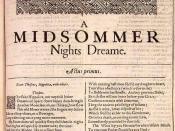When Shakespeare wrote his comedies, he didn't write them to be funny. He wrote them with a pattern. The comedies have many similarities, such as characterization, theme, plot, and language, hidden in them that one would not see without analyzing the plays. For example, A Midsummer Night's Dream, Twelfth Night, and Much Ado About Nothing all have much in common.
Each comedy contains many themes. One similar one, however, is the theme of love, deceit, and fickleness. In A Midsummer Night's Dream, the love potion symbolizes peoples ability to be fickle about love. It changes one person's view of another person. Demetrius hates Helena in the beginning of the play but ends up loving her in the end because of the love potion. In this play, Puck states, "Lord, what fools these mortals be." This even states how people in love are fools and don't know what they're doing.
The theme of people being fickle is also portrayed in Twelfth Night with the whole concept of Orisino only being in love with the idea of love itself. As soon as he finds out that Viola is in love with him, he changes his love from Olivia to Viola. Also, Olivia changes her love from Cesario to Sebastian just as quickly and Sebastian just thinks it's great to have a high class woman fall in love with him. The only true romantic in this play is Viola, who stays devoted to Orisino during the whole comedy. In Much Ado About Nothing, Benedick and Beatrice are both strongly against relationships and getting married. However, the comedy wouldn't be a comedy without fickleness about love. They quickly fall in love with each other and get married.
Another common theme among Shakespeare's comedies is deception. In Twelfth Night, almost every main character...


